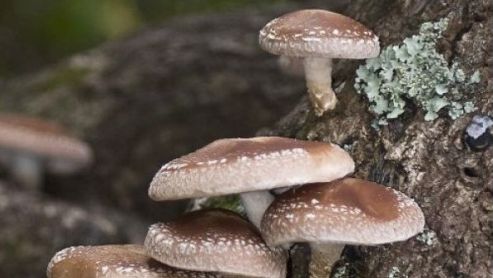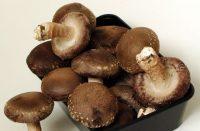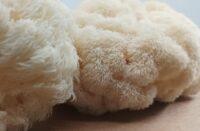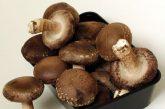Long a symbol of longevity in Asia because of their health-promoting properties, shiitake mushrooms have been used medicinally by the Chinese for more than 6,000 years. More recently, their rich, smoky flavor has endeared them to American taste buds and these exotic hearty mushrooms can now be found in supermarket shelves across the U.S. throughout the year.
Shiitake and Heart: cholesterol-lowering
Early research in the 70s already showed the benefits of shiitake mushroom in lowering cholesterol. Research conducted in Japan identified a specific amino acid in shiitake that helps speed up the processing of cholesterol in the liver. In a 1974 study (reported by Kenneth Jones in “Shiitake Medicine in a mushroom,” Herbs for Health, Jan/Feb 1997), 40 elderly individuals and 420 young women consumed nine grams of dried shiitake or the equivalent amount of fresh shiitake (90g) every day for 7 days. After a week, total cholesterol levels had dropped seven to 15% in the older group, and 6 to 12% in the young women.
Other Benefits of Shiitake Mushroom
Like maitake, shiitake also appears to be a formidable cancer fighter. In 1969, scientists at Tokyo’s National Center Research Institute isolated a polysaccharide compound from shiitake they called lentinan. In laboratory trials, lentinan caused tumors in mice to regress or vanish in 80 to 100% of the subjects. Lentinan appears to stimulate immune-system cells to clear the body of tumor cells.
What’s more, shiitake appears to be effective against some of the more serious viruses we face today: HIV and hepatitis B. Test-tube studies in Japan indicate that LEM (short of Lentinula edodes myucelium), an extract of shiitake mushroom, is more lethal to HIV-infected cells that AZT, a well-known medication developed to delay the progress of AIDS. In other test-tube studies, LEM lignins have been shown to block HIV cells from reproducing and damaging helpful T cells. These lignins also stop cell damage from herpes simplex I and II, two viral infections that often plague individuals with HIV.
Hepatitis B is a liver disease transmitted through transfusions, the use of unclean needles, or other blood-to-blood contact. In the 1980s, a trial involving 16 clinics in Japan investigated the impact of LEM on hepatitis B. The studies indicated that LEM may stimulate the body to produce antibodies. Forty individuals with chronic hepatitis B ingested six grams of LEM daily for four months. All of the patients experienced relief of hepatitis B symptoms, and in 15, the virus was inactivated.
Beinfield points our that shiitake “can be used as a food as well as a medicine. It treats nutritional deficiencies and improves immunity through diet”. Because of its appealing flavor and rich nutritional makeup, vegetarians sometimes use shiitake mushrooms as a substitute for animal protein.











